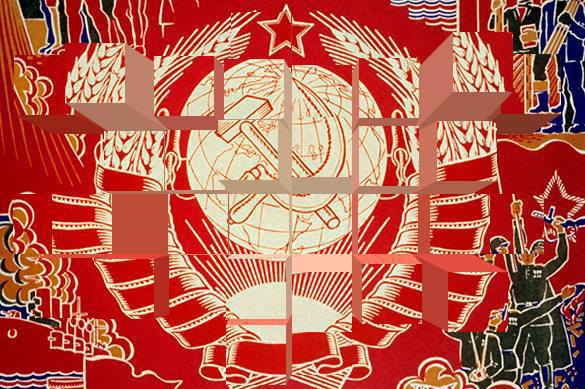Most Russians regret the collapse of the USSR
An opinion poll conducted by Levada Center to mark the December anniversary of the signing of Belavezha Accords, more than half of Russians (56%) regret the collapse of the USSR.

As many as 28% of Russians said they did not regret the disintegration of the Soviet Union, although this point of view was shared by 37% a year ago.
More than half of those dissatisfied with the collapse of the USSR said that they were concerned about the destruction of the economic system of the country.
Thirty-one percent of respondents said that the collapse of the USSR led to growing mistrust and bitterness to others. Only 12% of citizens believe that the USSR should be revived as it was. Experts note that the level of nostalgia has reduced considerably, as this idea found 30 percent of supporters in 2001.
A quarter of respondents would support "a union of several republics," while 21 percent said that they were satisfied with the Commonwealth of Independent States. The same number of people said that they would support a closer union among former Soviet republics, similarly to the European Union.
According to the survey, 51% of Russians believe that one could avoid the collapse of the USSR. Twenty-nine percent say that the collapse was inevitable. In addition, 29% of respondents said that the Belovezha Accords signed by the heads of the Russian, Ukrainian and Belarusian republics - Boris Yeltsin, Leonid Kravchuk and Stanislav Shushkevich about the formation of the CIS - was the main reason for the dissolution of the USSR.
Twenty-three percent of Russians believe that the Soviet Union broke up as a result of the intervention of "hostile foreign forces." As many as 21% of Russians said that the country ceased to exist because people were dissatisfied with the Soviet administration of Mikhail Gorbachev. According to 14 percent, the country failed to handle the military burden on its economy. According to 13%, the communist ideology had been exhausted.
The Soviet Union ceased to exist on December 8, 1991. The heads of the RSFSR, Belarus and Ukraine - Boris Yeltsin, Stanislav Shushkevich and Leonid Kravchuk - signed the so-called Belovezha Accords to terminate the existence of the Soviet Union and establish the Commonwealth of Independent States.
A lot has been said and written about the Accords, but one can distinguish between two basic opinions on the subject.
The first one of them says that the collapse of the USSR was not predetermined, and the Accords appeared just as an act of voluntarism of three politicians who did not want to share power with anyone. In addition, the then administration of the Soviet Union was no longer able to perform its duties.
According to the second opinion, it was impossible to prevent the collapse of the USSR. The "parade of sovereignties", as it was then called, was irreversible and the break up would have happened anyway, most likely in a violent form.
"One should not blame only Yeltsin, Kravchuk and Shushkevich for the agreements. The Constitution, on which they relied, gave members of the USSR an opportunity to pull out from the Union," Yabloko party leader Sergei Mitrokhin told the National Journal magazine. Mitrokhin blamed Leninist-Stalinist policy-makers, who proclaimed the right of nations to self-determination.
"The Bolsheviks had laid a time bomb, and Yeltsin and the company of those who signed the agreements, detonated the bomb," said Mitrokhin.
Noteworthy, Mikhail Gorbachev excludes the idea of the revival of the USSR. In an interview with KP, Gorbachev said that "some historians believe that the collapse of the Union started with the abjuration of the Brezhnev doctrine of the total control of the Soviet Union over the Eastern bloc." "There is nobody here to blame - it was us who buried the Union. We are to blame. I was struggling as much as I could to preserve the country. I wanted the republics to use their sovereignty. The Union should have been transformed and democratized."
Speaking of the Berlin Wall, Gorbachev said that the wall had become obsolete druing the 1980s. "There were democratic reforms in the Soviet Union, the relations with the United States had been restored, the relations with China had been restored as well, after 35 years of enmity. Velvet revolutions started happening in the Czech Republic and Hungary, for example. Yet, the Germans were sitting behind the wall, like lepers. Were we supposed to tell them to stay there because Hitler had started WWII? It would have been stupid to approach the problem like this," Mikhail Gorbachev said.
"The Germans had executed all of our most serious requirements. Nuclear weapons and NATO troops should not be deployed on the GDR. FRG troops should be cut from 600 to 300 thousand. Most importantly, we concluded the Big Treaty with the Germans. It was an amazing document, which contained everything that we wanted, for example the modernization of industry. There are still over 600 German companies working in Russia," Gorbachev said.
Pravda.Ru
Read article on the Russian version of Pravda.Ru
Subscribe to Pravda.Ru Telegram channel, Facebook, RSS!





